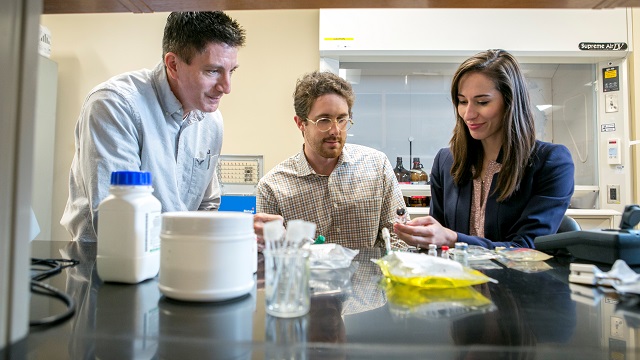
By Rachel Williams
Alabama NewsCenter

On the second floor of Samford University’s College of Health Sciences, Logan Joiner and Rachel Miller step out of the laboratory with exciting news. They have just completed research that can change the way pediatric cardiac patients receive medication and nutrition.
Pediatric patients in the cardiovascular intensive care unit (CVICU) at Children’s of Alabama often receive many medications and nutritional support that often require multiple intravascular (IV) access lines. Clinical management of these multiple lines can complicate medication delivery and increase patients’ risk of infection. Also, larger fluid volumes may be required to individually deliver the numerous medications.
The research that Joiner, Miller and McWhorter School of Pharmacy faculty members Greg Gorman and Kim Benner have completed has demonstrated that up to seven specific medications and nutrition can be delivered safely and simultaneously through a single IV access line to pediatric patients. Prior to this research, “potential compatibility issues with administration of these medications and nutrition often resulted in stopping administration of the nutrition while the medications were being delivered,” Benner said.
The study began in the spring semester of 2016 when Joiner was in his final weeks of pharmacy school and was performing research under Gorman. During this time, a CVICU physician approached Benner, who also practices at Children’s of Alabama, regarding this problem. In conjunction with CVICU pharmacists, the two approached Gorman about conducting laboratory work to solve this problem. While physicians and pharmacists at Children’s identified specific medications and nutrition commonly used in the CVICU, Gorman and Joiner designed and developed the procedures to be used to evaluate their compatibility.
This research conducted by Joiner and Miller is novel, because it tests the compatibility of more medications than ever before. While compatibility data for Y-site – a device that provides an access route for two IV fluids to infuse at the same time – is available for many medications, it is limited to the physical compatibility of only two medications mixing together just prior to being delivered to a patient.
“What makes this research so unique is that we are evaluating up to seven medications along with nutrition all combined together, so we’re getting questions answered that you can’t get from a textbook or other medical literature,” Gorman said.
Now that the compatibility of these multiple medications is known, it can soon begin to benefit pediatric cardiac patients. “We hope that it can eliminate the need to start all those other IV lines,” said Miller. “It’s exciting, because it translates from the lab to the patient immediately.”
The work that Joiner, Miller, Gorman and Benner have done along with physicians and pharmacists at Children’s is not limited to the CVICU.
“While it’s going to be applicable to our patients at Children’s, it is also worthy information for pediatric ICU patients all over the world. Other units of the hospital can use this information, too,” Benner said.
Team members are compiling, analyzing and writing their findings for publication. They hope to have their work submitted to a peer-reviewed journal by the end of 2016.




